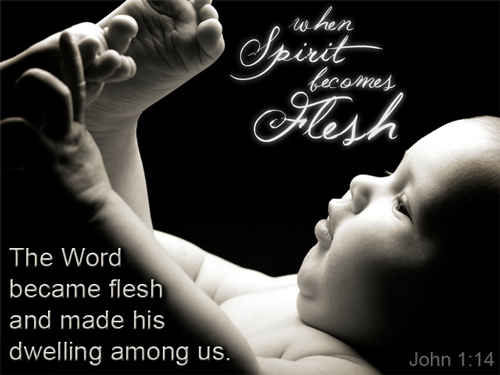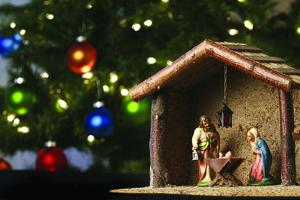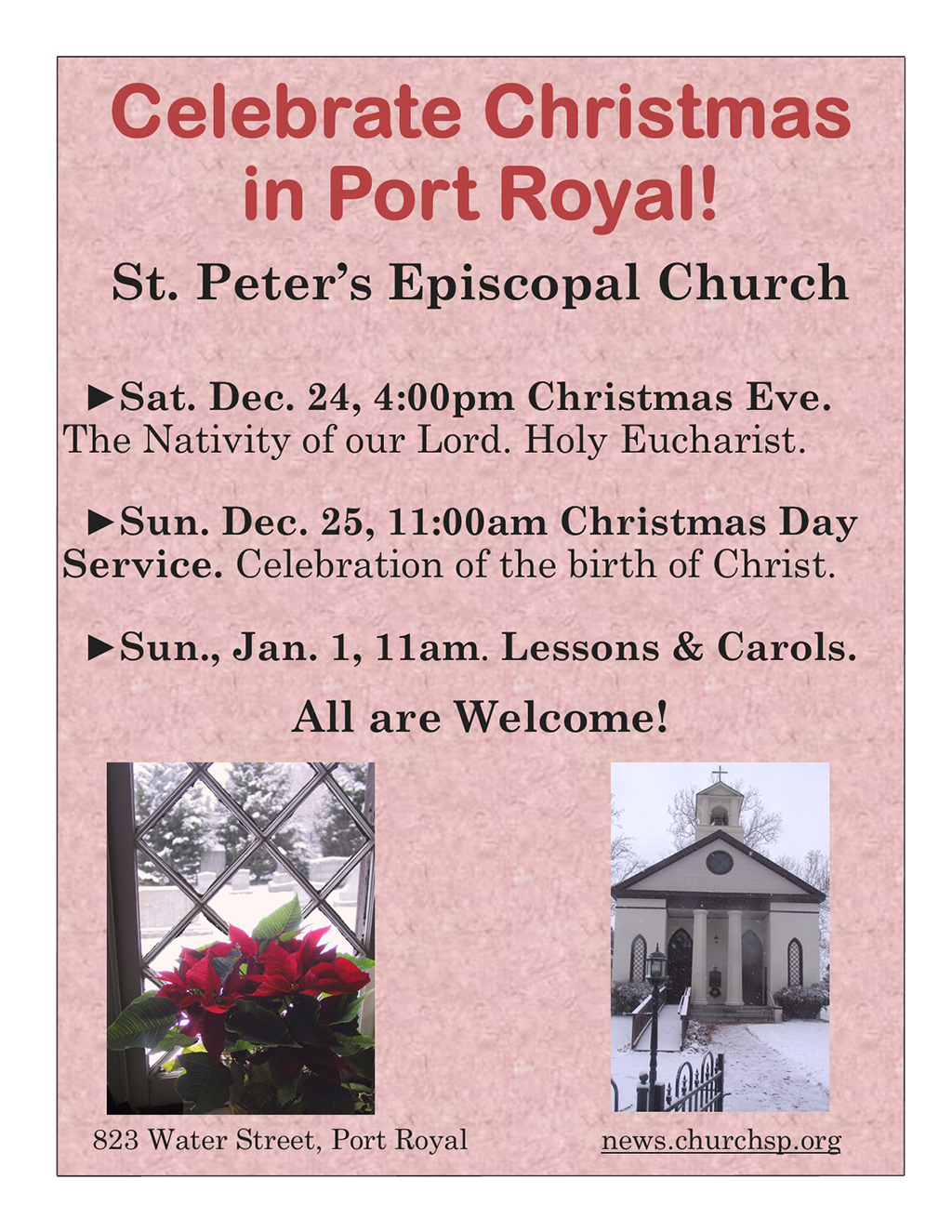2022 Sun Dec 25
Videos, Christmas Dec. 25, 2022
1 Gospel of John reading
2. Sermon – Rev. Catherine Hicks
3. Offertory – Denise Gregory, Mary Peterman
4. Concluding prayer – Hymn “I Heard the Bells”
Village Harvest in 2022
The Village Harvest grew in 2022 both in numbers and food. The number of people served rose from 999 to 1,051 and pounds of food from 14,303 to 15,302. The percentages of growth are 5% for people and 7% for food. This compared to 2019 (8%) and 3% for people and food respectively. (The 2019 harvest had only 11 periods and thus the numbers were annualized for the comparison). Additionally, the positive growth in both people and food had not occurred together since 2016.
One comparison is reviewing the Harvest is to consider. pounds per person. In 2022 it was 14.6 pounds closely followed in 2021 at 14.32. The 2022 figures not only posted an increase but are the best in the 8 year history of the harvest! Another achievement in 2022 was going over 10,000 people served over the lifetime of the Harvest
Thanks goes out to Eunice Key one of the originators of the program and who provide the name, “Village Harvest”. The success of the harvest is due to volunteers like Eunice and Cookie and Johnny Davis who have delivered food from the Healthy Harvest Food bank month after month as well as Jim and Elizabeth Heimbach. Kudos also go out to our current director Andrea Pogue who has contributed many pictures to display the Harvest.
Sermon, Christmas Day, Dec. 25, 2022
Sermon, Christmas Day III, 2022 John 1:1-14

In the magisterial opening of John’s gospel, John describes a great cosmic darkness into which life and light come—the Word made flesh, Jesus.
Ultimately, what difference does the coming of Jesus make to us several thousand years later? Why should we care?
Because as John points out, the world does not care. The world did not know Jesus, and does not know Jesus now.
So I ask you, “Why should we care? Why should we accept this Word into our lives?”
Because as St Athanasius says, “For the Son of God became man so that we might become gods.”
That is, we can only be what we are until we come across Jesus, and if we receive him, then our lives begin to expand, not only on this earth, but out into eternity.
As John puts it, “For all who receive him, who believe in his name, he gives the power to become children of God, who are born not just as flesh and blood, but born of God.”
That’s why the coming of Jesus makes a difference, and why we should care. Because receiving Jesus draws us into the life of God, into eternity beginning now, into love and into light, even in the darkness that surrounds us.
When we choose to become children of God, our vision changes. God gives us the great desire to see into the essence of the universe, to see into the essence of God’s creation, and to see deep into the hearts of one another.
Newborn babies are very sensitive to bright light. Their pupils are small, limiting the amount of light that comes into their eyes.
But as their retinas develop, their pupils widen and allow more light into their eyes. And, as Kierstan Boyd says in her article about the vision development of newborns, “they can see light and dark ranges and patterns.”
We human beings tend to limit the amount of light that comes into our eyes as well, limiting our vision to what fits into our limited world views, that is, until we become children of God.
Then, our “children of God” retinas develop, letting in more and more of God’s light. We can distinguish more clearly the light and the darkness and the patterns of light and darkness in our own lives and in the lives of those around us.
And as children of God, we gain the ability to see the light in others that is mostly hidden to all except to God.
As we see into the essence of things, we now see light even in the darkness of our lives. We see light in the lives of others. We can look into the light with no fear of being blinded. We realize that the light we are seeing is the light of love itself.
And so, our ability to love deepens. We gain the capacity to love ourselves as God loves us, and to love others as God loves them.
As we love with God’s love, the light of that love helps to push away the darkness of our own shame, and the darkness of hatred that is so much a part of our world.
To see light is to see God’s love at work in the world, and to see the potential of God’s work in the world—to see beyond the years into the mighty eternally transforming power of God’s love.
And as children of light, we become part of God’s work of love on this earth.
When we become children of God, God also gives us new hearing. We can hear God speaking in the sounds around us. We can hear the meaning of sounds.
When we hear people shouting with rage and hatred, we now can hear in their raging the interior voices of fear that drive the hatred. We can hear loneliness in the silence of the neglected.
Henry Wadsworth Longfellow could hear God’s voice in sounds. My reference is an article written by Dennis Rainey. Longfellow lived from 1807 to 1882 and was a well known poet in his time. He is still known today for his poems. But what I didn’t know about Longfellow was that his life was filled with great tragedy. In a horrible accident, his wife’s dress caught fire. Longfellow tried to put out the fire with his own body, but his wife was killed by the flames. And then, only two years later, in 1863, one of Longfellow’s sons, Charlie, joined Lincoln’s army. The Civil War raged as the country fought a war with itself.
On December 1, 1863, as Longfellow was eating dinner with his family, he received a war telegram letting him know that Charlie had been severely wounded and might be paralyzed for the rest of his life.
On Christmas Day, this widowed father of six, with a war raging through the nation, and his oldest son nearly paralyzed, heard the bells of the churches pealing. As Justin Taylor writes, Longfellow felt a war within his own heart. He could see for himself that there was no peace on earth. He could hear the destructive sounds of war, and yet, the sound of the bells promised peace on earth, goodwill to all. As Longfellow kept listening to the bells, he heard something beyond the sounds of the bells themselves. He heard the sound of hope in the midst of despair.
And so Longfellow wrote “I heard the bells on Christmas Day.” This poem is a testimony of this child of God’s ability to hear in the sounds of those Christmas Day bells the hope that we can hear as children of God,
the hope we hear in a sleeping child’s soft breathing, the hope of a kind word spoken into fear or sorrow, the hope that can rise in our hearts when we listen to music, the universal language, hope even in the sound of bells,
hope beyond the hatred and division of our times, hope that we someday, even in our differences, will all be one in God’s love.
The love and the hope that we experience as children of God change us into better people as we continue to grow in God’s love.
And so we find ourselves wanting to share that love and hope, because God’s love and hope for this world are too great to hoard—we cannot contain the immensity of either.
God’s love and hope flow through us out into the darkness of the world, and we become witnesses, like John the Baptist, who testified to the light and glorified God.
We children of God become the messengers that announce peace and bring good news. With God we bare our arms and fight the injustices around us. God gives us the power to offer the comfort on God’s behalf, the comfort that can come only from God, because we know that God is in the world and is always coming into the world in new ways, and bringing love, light, and new life.
And through the years, as God sustains our hope and enriches our love for God and for one another, the light of God’s love in our lives will shine ever more brightly.
God will set us, God’s children, on fire with love that can and will shine out with God’s radiance. And this fire of God’s love brings life and the light that illumines and transforms our minutes and our hours into the nearer presence of God in and through our love for one another. We can see and hear and know that we too are part of the eternity of God’s love.
And so the Word became flesh and lived among us, and we have seen his glory, the glory as of a father’s only son, full of grace and truth.
And so, yes, we care, these thousands of years later, that a baby has been born, and that angels are singing, and that shepherds are telling the good news of all they have seen and heard, that a star is shining, and that Mary is pondering all of these things in her heart.
For unto us a child is born, and if we choose to follow him, we too will sing, and tell out the good news, and shine and ponder it all, and get reborn for the love that never ends.
Resources:
https://www.aao.org/eye-health/tips-prevention/baby-vision-development-first-year
https://www.theraineys.org/post/i-heard-the-bells-on-christmas-day
Bulletin, Christmas Day, Dec. 25, 2022
Click here to view in a new window.
Videos, Christmas Eve, Dec. 24, 2022
1. Bethlehem Pastorale
2. Lighting of the Christ Candle
3. “It Came Upon a Midnight Clear”
4. “What Child is This”
5. Gospel and Sermon – Rev. Tom Hughes
6. “See Amidst the Winter’s Snow”
7. “Silent Night”
8 “O Little Town of Bethlehem (portion)
9 Concluding Prayer
Christmas
Christmas , December 25, 2022

Explore Christmas Eve– A study of the scriptures, art and the meaning of the Christmas Scriptures.

Explore the Art of the Nativity How the Nativity has been viewed by artists
 Rediscovering the love of God this Christmas- a one minute video from the Acts8Movement of the Episcopal Church
Rediscovering the love of God this Christmas- a one minute video from the Acts8Movement of the Episcopal Church

 Origins of 30 Christmas Carols
Origins of 30 Christmas Carols
 Unlikely Christmas Carols: Bruce Cockburn’s “Cry Of A Tiny Baby”
Unlikely Christmas Carols: Bruce Cockburn’s “Cry Of A Tiny Baby”

A post from teacher and theologian David Lose: “So maybe I shouldn’t describe this Christmas carol as “unlikely” in that Bruce Cockburn has explored the Christian story and theology, along with issues of human rights, throughout his forty-year career. But it may very well be unfamiliar to you. If so, you’re in for a treat, as the Canadian folk and rock guitarist, singer-songwriter’s beautiful retelling of the Christmas story blends elements of both Luke’s tender narrative of the in-breaking good news of God to the least likely of recipients – a teenage girl, her confused fiancee, down-and-out shepherds – with Matthew’s starkly realistic picture of a baby that threatens kings by his mere existence.
Here’s the link to a video with the words .
For more David Lose writing about the Christmas Eve and Christmas readings, check out the “Christmas sermon I need to hear.”

“Space in the Manger”
by Meghan Cotter. Meghan is executive director of Micah Ecumenical Ministries, a faith-based nonprofit that offers holistic care to the community’s street homeless

“Some time back, I watched a friend in need attempt to repair five years worth of disintegrating relationships. The library, a local gymnasium, a number of area businesses and even her family had cut off ties in response to her boisterously disruptive behavior.
” She’d picked up criminal charges—a few nuisance violations, a trespassing or two and an assault on an officer. At times, even the agencies trying to help her had been left with little choice than dismissing her from their facilities. But the more the community isolated her, the more volatile became her symptoms. She grew angrier and louder. Her self-appointment as the spokesperson for her homeless peers turned radical, even threatening. Feeling ignored and stripped of personhood, she waltzed into a church one Sunday, intent on being heard. Just in time for the sermon she rose from the congregation, rolled out a sleeping bag and unleashed a number of choice words to convey the plight of Fredericksburg’s homeless.
” The following morning, the church pastor faced a critical decision. In the interest of safety for his congregation, he too considered banning her from his church building. Instead, he made up his mind to find a way to help this woman. By the end of the week, she was hospitalized and taking medications. Within the month she had stepped down to Micah’s respite home, which cares for homeless individuals when they are discharged from the hospital. She realized how sick she really was, and a new person emerged before our eyes. She reunited with family, paid off fines, regained her driver’s license, became remarkably motivated to comply with doctor’s appointments. She set goals—seeking disability, but only temporarily, going back to school, earning a nursing degree and finding a way to productively address the needs of the community’s homeless.
“Christmas on the Edge” – Malcolm Guite
Christmas sets the centre on the edge; The edge of town, the outhouse of the inn, The fringe of empire, far from privilege And power, on the edge and outer spin Of turning worlds, a margin of small stars That edge a galaxy itself light years From some unguessed at cosmic origin. Christmas sets the centre at the edge.
And from this day our world is re-aligned A tiny seed unfolding in the womb Becomes the source from which we all unfold And flower into being. We are healed, The end begins, the tomb becomes a womb, For now in him all things are re-aligned.
Alexander Shaia – “Solstice, Shepherds & Your Animal Spirit”
Alexander Shaia is the author of Heart and Mind: The Four-Gospel Journey for Radical Transformation. A number of years we read the book together in Christian ed.
In this video he is talking about the shepherds in Luke’s Gospel. The video starts at the 2:42 mark to get to his main message:
You can read portions of the transcribed text here
“The text is really primarily about your life whenever your life is in the deepest night, when your life is in the deepest dark.”
“The Beauty of the Shepherds story in Luke is that it tells about the journey we make hearing deep in the night of our life an angel announce that there is a birth but that we have make a journey through the night to the dawn where we will see with our own eyes that fresh radiance born before us.”
A Christmas Message from Bishop Goff – “Where is this stupendous stranger?”

“So I invite us all to a spiritual discipline in this holy season and that is to spend ome time with someone you don’t ordinarily engage…maybe someone of a different generation either much older or much younger than you or someone of a different race or ethnicity, a different culture or religion, a different economic circumstance.
“Have a cup of coffee together or a meal together, talk and listen deeply. Look for the face of Christ in that person. Because as we come to really know a stranger in our midst we welcome Christ who was himself a stranger and we find surprising connections that we never imagined with other natives of this world God made.
Christmas Eve , December 24, 1968, at the Moon with Apollo 8

53 years ago on Christmas Eve we witnessed the moving reading of the first 10 verses of Genesis for the largest audience up to that time. They were told to something appropriate. The astronauts have reflected on the event. A newspaper friend of Borman tried to think of what to say and he could come up with nothing after a night’s work. His wife said (raised in convent in France) suggested, “Why don’t you start in the beginning” He said “Where?”. She said “Genesis in the Bible.” They reflected later – “Why didn’t we think of that.” Borman explained they tried to convey not happen stance but power behind world and behind life gave it meaning. As he later explained, “I had an enormous feeling that there had to be a power greater than any of us-that there was a God, that there was indeed a beginning.”
The full story is here
Sunday Links, Christmas Eve, Christmas Day

Communion, Dec. 18
Dec. 24, 4:00pm – Christmas Eve
Dec. 25, 11:00am – Christmas Day
The Christmas Eve service did not go as expected. Our video stream was shutdown by an electric failure. Our organist was sick and others were away. We couldn’t do Silent Night in German due to the illness of our German speakers
We pivoted and the service was different but meaningful. We rearranged the bulletin. We had 2 large families who came in force and we went out caroling to a parishioner family who was ill. All ages came together.
During the service two ladies in the choir (Denise Gregory, Mary Peterman) provided all the music on piano and flute. And it worked! They came back on Christmas day and performed as well. Our hearts and thanks go out to them.
Bulletin, Christmas Eve, Dec. 24, 2022
Click here to view in a new window.
Christmas Services
Our Christmas services this week and next. A time to worship with friends and neighbors in one of the holiest times. There is always room in this inn! Christmas blessings to all!

ECM gives $1,250 to the Community for Thanksgiving and Christmas, 2022

Each year the Episcopal Church Men (ECM) provide support to those in need during the holidays by coordinating with the Caroline County Department of Social Services. In pre-pandemic times they donated Thanksgiving dinners and Christmas gifts to specific families from Social Services. With the Pandemic the Department of Social Services will continue providing families with secure store specific grocery limited gift cards.
This year $500 was given for Thanksgiving and $750 for Christmas for a total of $1,250. It was the third year since 2020 that over $1,000 was provided!
Thanks to all who contributed and to Ken Pogue and the leadership in the ECM for their work in organizing their ministry and this outreach effort!
